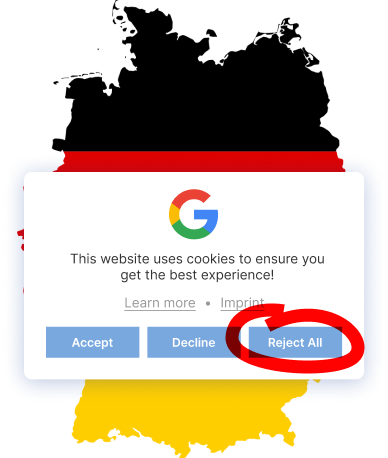Introduction
Google, a multinational technology company, has faced scrutiny from the German Commissioner for Data Protection and Freedom of Information (HmbBfDI) regarding its cookie consent banners. In recent years, Google’s data protection practices and compliance with European Union (EU) regulations have come under examination. The German DPO has specifically called for the inclusion of a “reject all” cookie consent option on Google’s search pages and YouTube.
The demand comes in response to growing concerns expressed by German authorities regarding the privacy practices of online services, particularly regarding the use of cookies and the processing of personal data. This article will delve deeper into the broader context, implications, and significance of this demand, shedding light on critical aspects of data protection and the crucial role of consent in safeguarding individuals’ rights. Read more about GDPR in Germany here.
Background of the case
In May 2021, Germany’s antitrust watchdog initiated proceedings against Google Germany, Google Ireland, and parent company Alphabet, highlighting concerns related to data protection and competition. Additionally, Google’s data terms faced scrutiny from German regulators, who emphasized the importance of clear, informed, and freely given consent in accordance with EU standards. These events set the stage for the subsequent focus on Google’s cookie consent banners.
Hamburg DPO’s call for “reject all” cookie consent
On April 5, 2022, Hamburg’s Commissioner for Data Protection, Thomas Fuchs, addressed Google’s non-compliant consent banners. Fuchs argued that the existing banners did not meet European data protection requirements and urged Google to include a “reject all” cookie consent option on its search pages and YouTube. The objective behind this proposal was to provide users with a more comprehensive choice regarding their data privacy.
Google’s response and compliance efforts
Google acknowledged the concerns raised by the German DPO and pledged to rectify the situation. In April 2022, the company announced its plan to update cookie banners across Europe, offering users the ability to reject all tracking cookies with a single click. This move aimed to align with EU privacy and data laws and mitigate potential violations.
Reactions and implications
The German regulator welcomed Google’s commitment to implementing a “reject all” button on its cookie banners, considering it a step towards compliance with EU regulations. This development showcased the significance of the German DPO’s role in pushing for enhanced data protection measures.
Data protection and privacy landscape in the European Union
In the European Union, specific regulations are in place to ensure that individuals’ personal information is kept safe and secure. These regulations are designed to protect the privacy of EU citizens in the digital age, and they apply to both businesses and individuals who collect, use, or process personal data. The regulations cover a wide range of topics, including data storage, data sharing, and data processing. It is vital for everyone to be aware of these regulations to ensure that they are complying with the law and protecting their own privacy as well as that of others.
The General Data Protection Regulation (GDPR) and its importance
The GDPR is a crucial legal framework emphasizing protecting personal data and privacy. It outlines the responsibilities of organizations in ensuring the lawful and transparent processing of personal data.
Role of Data protection authorities
Data protection authorities, such as the French Data Protection Authority, play a vital role in upholding data protection regulations. They oversee data flows and enforce compliance, ensuring that organizations act as a responsible data controller and protect the rights of data subjects.
Significance of data protection laws in the European Union
Data protection laws across the European Union are designed to establish a robust framework for safeguarding personal data, empowering individuals with control over their information, and setting data handling and processing standards.
The role of consent in personal data processing
Ensuring individuals’ rights and freedoms is crucial in protecting their privacy and data. Consent plays a vital role in achieving this. Failure to obtain explicit consent before processing personal data can lead to violations of privacy laws and regulations, with legal repercussions. Therefore, obtaining explicit and informed consent from individuals before processing their data is crucial.
Understanding the concept of consent in data protection
Consent serves as a fundamental principle in data protection. It requires organizations to obtain clear, informed, and freely given consent from individuals before processing their data. The GDPR sets specific legal requirements for valid consent.
The need for transparent consent frameworks
Transparent consent frameworks, accompanied by clear and concise cookie notices and banners, are vital to informing individuals about their data processing and rights. It ensures that individuals are well-informed and can make meaningful choices regarding the use of their personal data collected.
Right to withdraw consent and individual control
Data subjects can withdraw their consent at any time. Providing users with a “reject all” cookie consent option offers greater control, allowing individuals to opt out of targeted advertising and other processing activities.
Empowering users with privacy choices
By advocating for a “reject all” cookie consent option, the German DPO aims to empower users, giving them more control over their data and enhancing their ability to manage their privacy preferences effectively.

The demand for a “reject all” cookie consent option
As the use of cookies continues to be prevalent across various websites, there has been a noticeable increase in the demand for a “reject all” option for cookie consent. This feature would allow users to decline all cookie requests with a single click instead of manually dismissing pre-ticked boxes. Such an option would provide a more efficient and streamlined browsing experience and greater control over personal data privacy.
Addressing concerns about online services and cookies
The demand explicitly targets Google’s privacy practices and the use of cookies within its online services. It seeks to address concerns related to collecting, processing, and protecting individual’s data in the digital landscape.
Importance of cookie notices and banners
Cookie notices and banners are critical tools in providing individuals with relevant information about the use of cookies and their rights on time. A “reject all” option in cookie notice ensures individuals have meaningful choices regarding their personal data processing.
User control and managing privacy preferences
By implementing a “reject all” cookie consent option, Google would empower users to exercise their privacy rights and make decisions aligned with their preferences, enhancing overall control over their data.
Balancing privacy rights and organizational interests
The call for a “reject all” option highlights the ongoing efforts to strike a balance between individuals’ privacy rights and the legitimate interests of organizations, such as Google, operating in the private sector. It emphasizes the need for organizations to prioritize the protection of personal data while respecting the rights and choices of data subjects.
Ensuring compliance and protection of personal data
It is of utmost importance for any responsible entity to prioritize compliance and take necessary measures to safeguard the personal data of individuals. This includes implementing proper security protocols and following all relevant regulations and laws. Failure to do so can result in severe consequences for both the entity and the individuals affected. Therefore, being vigilant and proactive in protecting sensitive information is essential.
Organizational measures for data protection
Organizations must implement robust organizational measures to ensure compliance with data protection regulations. This includes establishing appropriate data protection policies, procedures, and safeguards to protect personal data against unauthorized access, breaches, and other security risks.
Addressing data breaches and storage limitation
Data breaches pose significant risks to individuals’ data, potentially leading to unauthorized access or misuse. Compliance with the storage limitation principle ensures that personal data is retained only for as long as necessary for the purposes for which it was collected, reducing the risk of data breaches.
Legal framework and processing personal data lawfully
The GDPR provides a comprehensive legal framework for legally processing personal data. Organizations must establish a legal basis for processing personal data, ensuring that it aligns with the purposes for which the data was collected and that the rights of data subjects are respected.
Role of data protection authorities in enforcement
Data protection authorities, including the German DPO and other supervisory authorities, play a vital role in enforcing data protection laws. They have the power to investigate complaints, conduct audits, impose fines, and take enforcement actions against organizations that fail to comply with data protection regulations.

Implications and future outlook
The implications and future prospects of data privacy must be carefully considered in order to make informed choices. By taking into account all possible outcomes and consequences, individuals and organizations can better weigh their options and make decisions that align with their goals and values. Looking ahead, it is important to recognize that the choices made today will shape the course of the future. Therefore, it is essential to remain open-minded and adaptable in the face of changing circumstances and emerging trends.
Impact on Google’s privacy practices
The demand for a “reject all” cookie consent option from Google may necessitate changes in their privacy practices. It could lead to enhanced transparency, more user-centric privacy choices, and a focus on respecting individuals’ control over their personal data.
Advancing user privacy and data control
The demand aligns with the broader objective of advancing user privacy and granting individuals greater control over their personal data. It emphasizes the significance of providing meaningful consent options and ensuring individuals can exercise their rights effectively.
Considering potential repercussions for online services
The call for a “reject all” option from a prominent data protection authority raises questions and considerations for other online services as well. Organizations may need to reassess their cookie consent mechanisms, privacy practices, and data-handling processes to align with evolving regulatory expectations and user demands.
Addressing public concerns and building trust
The demand for a “reject all” cookie consent option reflects the growing concerns and expectations of the public regarding data protection and privacy. In an era where personal data is increasingly collected and processed, individuals are becoming more conscious of their rights and the need for greater control over their personal information. By advocating for stronger privacy choices, the German Data Protection Officer aims to address these concerns and build trust between users and organizations.
Conclusion
The demand from Hamburg’s Commissioner for Data Protection and Freedom of Information (HmbBfDI), Thomas Fuchs, urging Google to implement a “reject all” cookie consent option brings to light important aspects of data protection and privacy rights. It underscores the significance of consent, transparency, and user control in processing personal data. With data protection authorities actively enforcing regulations such as the GDPR and addressing public concerns, organizations are compelled to review their privacy practices, enhance transparency, and prioritize individuals’ rights in collecting and processing personal data.
As the dialogue surrounding data protection and privacy continues to evolve, the implementation of a “reject all” cookie consent option by Google has the potential to set a precedent for other online services and shape future privacy practices. Organizations can foster trust, enhance user experiences, and demonstrate their commitment to respecting privacy rights by empowering individuals with greater control over their personal data.
Ultimately, the demand for a “reject all” cookie consent option serves as a reminder that data protection is an ongoing process that requires continuous evaluation, adaptation, and alignment with the changing regulatory landscape and societal expectations. It encourages organizations to prioritize user privacy, engage in transparent data practices, and embrace responsible data stewardship to ensure the protection of individual’s personal information in the digital age.







